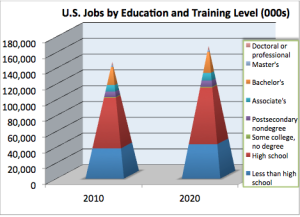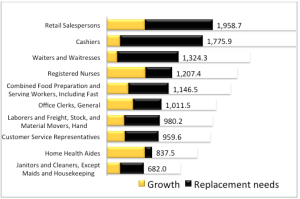The “knowledge economy” is perhaps the dominating narrative in California employment in 2013. It is a narrative pushed forward by a number of the state’s leading policy organizations, management consulting firms, and economic development agencies. Some of the narrative is correct; a good part of it is incorrect.
According to this narrative, the knowledge economy holds the jobs for California’s future. Knowledge economy jobs are jobs that generally require college training and in many cases post-college degrees, and substantial analytic skills—jobs as financial analysts, health care analysts, computer programmers, software engineers, educational counselors, post-secondary teachers, and other related thought occupations. These jobs are expanding and will continue to expand.
What is lagging in California is the college graduation rate. The path to fuller employment and prosperity in California lies in increasing our college graduation rate.
There are a number of points to be made about the narrative, but let’s start with recent data and reporting on the relation between college degree and employment.
In January of this year, the Center for College Affordability and Productivity, based in Washington D.C., issued its report on college graduates and employment. The report, “Why Are Recent College Graduates Underemployed? University Enrollments and Labor Market Realities” found that in 2010, 41.7 million college graduates were employed in the United States labor market. Of these, only slightly more than half were employed in jobs that required a college degree. 48% were employed in jobs that required less than a bachelor’s degree. 37% were employed in jobs that only required a high school degree.
Following this report, other articles in the past few months have chronicled the large number of college graduates in minimum wage jobs and in jobs that don’t require a college degree. The titles of these articles indicate their themes: “Millions of Graduates Hold Jobs That Don’t Require a College Degree” (Chronicle of Higher Education, January 28, 2013), “It Takes a B.A. to Find a Job as a File Clerk” (New York Times, February 19, 2013), “Why a BA is Now a Ticket to a Job in a Coffee Shop” (The Daily Beast, March 27, 2013). Even when a college degree is called for by the employer, these articles note that the degree is mainly used as a “sorter” among applicants, rather than any indication of skills needed.
The takeaway from these articles is not that young Californians should be discouraged to go college. In speaking with young people and parents these days I encourage all possible to attend and graduate from college. It is a good investment financially, and even a better investment for life. Collectively, our economy benefits from a high percentage of college graduates, as it promotes entrepreneurship and holds other spin-off impacts.
Yet, our knowledge economy theorists mislead us when they overstate the link between increasing college graduation and significantly reducing unemployment and/or underemployment. Our California economy will continue to have a majority of its jobs outside of the knowledge economy. We need to give a lot more thought to these non-knowledge economy jobs, their pay, conditions and autonomy.
The chart above is drawn from the United States Bureau of Labor Statistics (BLS) job projections for 2020. There is projected growth in jobs requiring a Bachelor’s degree or above. The knowledge economy will hold a wide variety of job opportunities for California’s college graduates.
However, as shown on this chart, the great majority of jobs currently and in the future will require a high school degree or less.  The role of the “non-knowledge economy” is also highlighted in the second chart below. It is used in presentations by BLS Regional Commissioner Richard Holden and shows the 10 occupations with largest projected number of job openings, 2010-2020. The yellow represents growth, the black represents replacement needs.
The role of the “non-knowledge economy” is also highlighted in the second chart below. It is used in presentations by BLS Regional Commissioner Richard Holden and shows the 10 occupations with largest projected number of job openings, 2010-2020. The yellow represents growth, the black represents replacement needs.
The knowledge economy represents an important part of California’s employment future. But it is only a part, and its role should not be oversold.

